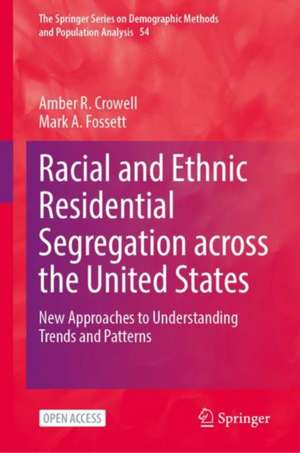Racial and Ethnic Residential Segregation Across the United States: New Approaches to Understanding Trends and Patterns
Autor Amber R. Crowell, Mark A. Fossetten Limba Engleză Paperback – sep 2023
| Toate formatele și edițiile | Preț | Express |
|---|---|---|
| Paperback (1) | 419.43 lei 43-57 zile | |
| Springer International Publishing – sep 2023 | 419.43 lei 43-57 zile | |
| Hardback (1) | 426.72 lei 43-57 zile | |
| Springer International Publishing – sep 2023 | 426.72 lei 43-57 zile |
Preț: 419.43 lei
Nou
Puncte Express: 629
Preț estimativ în valută:
80.26€ • 84.02$ • 66.41£
80.26€ • 84.02$ • 66.41£
Carte tipărită la comandă
Livrare economică 07-21 aprilie
Preluare comenzi: 021 569.72.76
Specificații
ISBN-13: 9783031386039
ISBN-10: 3031386035
Ilustrații: XVIII, 245 p. 1 illus.
Dimensiuni: 155 x 235 mm
Greutate: 0.37 kg
Ediția:1st ed. 2023
Editura: Springer International Publishing
Colecția Springer
Locul publicării:Cham, Switzerland
ISBN-10: 3031386035
Ilustrații: XVIII, 245 p. 1 illus.
Dimensiuni: 155 x 235 mm
Greutate: 0.37 kg
Ediția:1st ed. 2023
Editura: Springer International Publishing
Colecția Springer
Locul publicării:Cham, Switzerland
Cuprins
1. Introduction.- 2. Overview of Trends and Patterns in Segregation.- 3. Strategies for Measuring and Analysing Segregation.- 4. Description of Trends in White-Minority Segregation (with additional co-author Wenquan Zhang).- 5. Latinos, Asians, and Blacks in New Destinations (with additional co-author Rogelio Saenz).- 6. Micro-Macro Links in Residential Segregation – How groups differ.- 7. Cross Community Variation in Segregation.- 8. Segregation of Multiracial Individuals and Households (with additional co-author Jessica Barron).- 9. Segregation in Rural Nonmetropolitan Communities (High D Low S) special case analysis.- 10. Latino and Asian Subgroups(with additional co-author Wenquan Zhang).- 11. Segregation in 1930 vs 2010.- 12. Overview and Conclusions.- Appendix 1. Symbols and Notation.- Appendix 2. Overview of Segregation Measurement.
Notă biografică
Amber R. Crowell is Associate Professor of Sociology at California State University, Fresno. She has previously served as a Postdoctoral Research Associate at the Texas Federal Statistical Research Data Center. She earned her PhD in Sociology from Texas A&M University. Her research is on residential segregation, racial and ethnic inequality, housing, and quantitative research methods. She has co-authored articles in professional journals on the micro-level determinants of metropolitan residential segregation patterns using innovative new methods of measurement and analysis. She has also published on evictions and inequalities in the rental housing market. She has received numerous grants to support research in the areas of residential segregation and housing.
Mark Fossett is Professor of Sociology and College of Liberal Arts Cornerstone Faculty Fellow at Texas A&M University, College Station, Texas where he has served as Department Head, Founding Director of the Texas Federal Statistical Research Data Center, and President of the Southwestern Sociological Association and the Southern Demographic Association. His research on urban and spatial demography, racial-ethnic segregation and inequality, and quantitative research methods has been supported by major funding agencies and has been published in multiple books and in many dozens of book chapters and articles in professional journals. His book New Methods for Measuring and Analyzing Segregation (Springer 2017) introduces methods used in this work.
Textul de pe ultima copertă
This open access book provides new findings on and insights into trends and patterns in residential segregation between racial and ethnic groups in the United States. It draws on new methods that make it possible to investigate segregation involving small groups and segregation patterns in nonmetropolitan communities with greater accuracy and clarity than has previously been possible. As one example, the authors are able to track residential segregation patterns across a wide selection of nonmetropolitan communities where Black, Latino, and Asian populations are small but can still potentially experience segregation. The authors also track White-Latino segregation from its inception when Latino households first arrived in non-negligible numbers in new destination communities and then document how segregation changes over time as the Latino population grows over time to become larger and more established. Finally, this work shows how segregation of Latino and Asian households is fundamentally different from that of Black households based on the much greater role that cultural and socioeconomic characteristics play in shaping White-Latino and White-Asian segregation in comparison to White-Black segregation.
Caracteristici
This open access book provides new insights about racial and ethnic residential segregation Clarifies how segregation for a city arises out of micro-level processes of residential attainment Examines segregation in settings not normally examined in segregation studies This book is open access, which means that you have free and unlimited access
